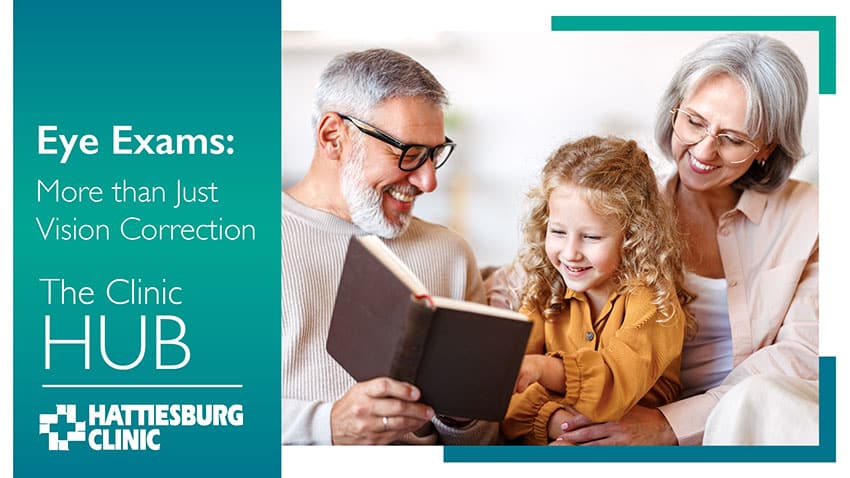Eye Exams: More than Just Vision Correction
When it comes to our health, many of us prioritize regular check-ups for our physical well-being. However, eye health often falls by the wayside, especially if we believe our vision is normal. You may think an eye exam is unnecessary if you can see clearly and have no noticeable issues, but that is not necessarily the case. Regular eye exams are often associated with getting a new prescription for glasses or contact lenses, but their benefits extend beyond vision correction.
Early Detection
Regular eye exams offer one of the most significant benefits: early detection of eye diseases. Many serious eye conditions develop gradually and are often asymptomatic in their early stages. By the time symptoms are noticeable, the disease may have progressed to a point where irreversible damage has occurred. A yearly eye exam can detect conditions such as glaucoma, macular degeneration and cataracts early on, when treatment is most effective.
For example, glaucoma, a leading cause of blindness, can develop without any noticeable symptoms. An eye doctor can detect increased intraocular pressure, a key indicator of glaucoma, before the condition worsens. Early diagnosis allows for treatment options, including medication or surgery, which can prevent vision loss. Similarly, macular degeneration, common in older adults, can be detected through routine eye exams. Early detection may not cure these diseases, but it can slow their progression and preserve sight.
Eye exams can also detect signs of systemic conditions such as high blood pressure, diabetes and even certain types of cancer through changes in the blood vessels of the eyes. Diabetic retinopathy, a common complication of diabetes, can be identified during an eye exam even before a patient is diagnosed with diabetes. Detecting these changes early can prompt further medical evaluation and intervention, potentially preventing serious complications.
Christopher L. Cooley, MD, a physician with Hattiesburg Clinic Eye Associates, stressed the importance of eye exams for everyone, not just those with vision problems. “Even if you think your vision is perfect, there could be underlying issues that only a comprehensive eye exam can detect,” Dr. Cooley said. “Don’t wait until you notice a problem. By then, you might be dealing with more than just an inconvenience.”
Improved Quality of Life
Many people live with subtle vision impairments that they are not aware of, which can lead to daily challenges like headaches, eye strain or difficulty focusing. Regular eye exams can help detect minor changes in vision that may go unnoticed but still affect your quality of life.
Undiagnosed or uncorrected vision problems can lead to fatigue, difficulties in concentrating and even reduced performance at work or school. Children, in particular, may struggle academically if they have uncorrected vision problems, as they may have difficulty seeing the blackboard or reading textbooks.
Jane E. Kersh, MD, with Hattiesburg Clinic Eye Physicians & Surgeons, urges parents to maintain regular eye exams for their children. “Children’s vision can change rapidly as they grow, and undiagnosed vision problems can significantly impact their learning and development. An eye exam can ensure your child sees clearly and comfortably,” Kersh said. “It’s not just about checking for nearsightedness or farsightedness; we also assess how well their eyes work together, which is crucial for reading and other tasks.”
Eye Strain Reduction
In our digital age, many of us spend hours staring at screens, leading to digital eye strain. Even if your vision seems fine, an eye exam can help identify early signs of strain, and your ophthalmologist can provide advice on how to reduce its effects. This might include recommendations for specific lenses, screen time limits or exercises to reduce strain and maintain eye health, which improves comfort and productivity.
Age-Related Vision Monitoring
As we age, our eyes change, and the risk of developing eye conditions increases. Regular eye exams are crucial for monitoring these changes and managing age-related eye issues. Early detection of conditions like cataracts or presbyopia (age-related farsightedness) allows for better management and treatment, ensuring that your vision remains as clear as possible as you age. According to the American Academy of Ophthalmology, adults should have a complete eye exam at age 40. Adults aged 65 and older should schedule yearly eye exams to check for issues.
Julie L. Lynn, MD, with Hattiesburg Clinic Eye Physician & Surgeons, has special practice interests in cataracts and glaucoma. “Aging naturally affects our eyes, and conditions like cataracts become more common as we age,” Lynn said. “However, these issues don’t have to impact your quality of life if caught early. Regular eye exams allow us to monitor your eye health closely and provide the necessary interventions.”
Vision Correction
Regular eye exams are essential for keeping your glasses or contact lens prescription current. Vision changes can occur gradually, sometimes so slowly that you might not notice them right away. During an eye exam, your optometrist will conduct a series of tests to measure how well you see at various distances. These tests help identify any changes in your vision that may necessitate a new prescription. Even a slight change in your vision can lead to headaches, eye strain and other discomforts, making an updated prescription essential to ensuring your vision is at its best.
Choose Hattiesburg Clinic
The optometrists and ophthalmologists at Hattiesburg Clinic are trained to examine, diagnose and manage disorders that affect the eye or vision and offer a range of preventative and corrective eye care. We treat patients of all ages and offer seven locations across South Mississippi for all your vision needs, including two on-site optical shops.
For more information on the ophthalmology and optometry services offered at Hattiesburg Clinic, visit www.hattiesburgclinic.com/optometry-ophthalmology.
